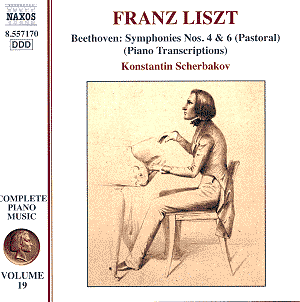I have to confess that Lisztís transcriptions
for piano of Beethovenís symphonies were completely new to me
so this disc has proved a complete surprise. My first reaction
is that Beethovenís supreme inventiveness is equally clear in
these transcriptions as it is in their original versions; that
is also a tribute to Liszt. These works must be extremely taxing
for the performer as thereís no let up in them. Liszt does his
utmost to have the piano cover as much of the orchestraís role
as is possible, and pretty well succeeds.
Liszt wrote of the piano, in a letter to Adolphe
Pictet, that "in the space of its seven octaves it contains
the range of a whole orchestra, and the ten fingers of a single
man are enough to render the harmonies produced by the concurrence
of over a hundred concerted instruments". From a fellow reviewer
I borrowed the complete set of the transcriptions of all the symphonies
(Harmonia Mundi, HMX 29011 92-98) (They are also available on
Naxos from the pianist on this review disc, and at budget price).
I was therefore able to compare 3 different pianists as Harmonia
Mundi have Michel Dalberto playing the Pastoral and Alain Planès
as pianist on the No.4. I also got out my set of symphonies with
Christopher Hogwood and the Academy of Ancient Music. I was struck
by the timings:
Symphony No.6
Konstantin Scherbakov 39:90
Michel Dalberto 40:49
Christopher Hogwood 41:13
Symphony No.4
Konstantin Scherbakov 33:01
Alain Planès 32:03
Christopher Hogwood 35:16
Of course this is not a scientific way of proving
that Liszt left nothing out but itís my impression that he left
out nothing of substance. No, these works of Liszt are his homage
to the great composer he was fortunate enough to meet shortly
after moving to Vienna in 1822, at the age of 11. In fact it was
in the newspaper Allegemeiner Theaterzeitung, in 1839, that critic
Heinrich Adam wrote of Lisztís own rendition of the last three
movements of the Pastoral "The transcription of this great
and complicated composition for the pianoforte was a task as daring
as it was difficult, if it was not to be only a brilliant concert
piece, but much more than that, a work without arbitrary additions
or omissions reproduced with artistic fidelity and scrupulousness
according to its innermost being, and only an artist like Liszt,
who with an unbounded reverence for Beethoven, has rare gifts
in understanding the great German master, only such an artist
was able and dared venture on so dangerous an undertaking".
It is a strange experience at first to hear music
that is so instantly recognisable and familiar in a version for
a solo instrument rather than the 46 that play in my Christopher
Hogwood disc of the "Pastoral". However, very soon I
was so involved in the music that although I knew what was coming
and could sing along or whistle to the theme, I didnít feel acutely
aware of the missing strings, etc. Naturally some moments brought
me back to the realisation that I was hearing a lone piano, the
birdsong in the second movement, being an obvious example.
Amazingly, however, I found myself hearing echoes
of Alkan, that strange piano visionary, especially on track 4
of this symphony, the Allegro describing the thunderstorm. Those
of you who know of Alkan do see if you agree. Of course Alkanís
dates (1813-1888) almost mirror those of Liszt (1811-1886). I
think we can be fairly safe in the assumption that they heard
each other play. Itís not that Liszt has changed any of Beethovenís
music but the way he has transcribed it makes it sound uncannily
similar to such works of Alkan as the "Allegro Barbaro".
Comparing the two versions of the "Pastoral"
symphony I found that Michel Dalberto from the Harmonia Mundi
set lacked the drive that made Konstantin Scherbakov sound like
a man possessed when called for, especially in the aforementioned
track 4. Dalberto plays in a rather lacklustre fashion with none
of the fire that illuminates Scherbakovís performance. However,
itís not to say that Scherbakov canít produce gentle, hushed toned
when called upon to do so, witness the calm after the storm. The
whole experience of listening to such a work for a solo piano
played by this consummate artist is nothing short of revelatory.
Listening to Lisztís transcription of Symphony
No.8 was also a fascinating experience. Right from the very first
notes I had the impression that Alain Planès was playing
someone elseís music whilst Konstantin Scherbakov sounded to me
as if he was playing his own music. His rendition
was so natural the music seemed to flow from his very being Ė
it was quite uncanny. It was a superb performance that made me
want to rush out to find other works he has played. At the Lucerne
Festival Scherbakov was hailed by the critics as a modern Rachmaninov
and I can see why. Iím hungry to hear his playing of that composerís
works and wonder if Rachmaninov ever recorded these transcriptions.
If he did there would be some thrilling comparisons to be made.
To sum up: transcriptions like these are true
vehicles for virtuosity and demand virtuosos to perform them.
Neither Michel Dalberto nor Alain Planès demonstrate the
unremitting drive required to bring these works off. Konstantin
Scherbakov, by contrast, plays with a white-hot intensity that
makes for thrilling listening and the result is that Lisztís work
on transcribing these symphonies is allowed to stand on its own
without any comparison with the original works being made, even
unwittingly. If like me you have never heard these transcriptions
before you are in for a treat. The whole exercise has made me
eager to explore the rest of this series.
Steve Arloff
